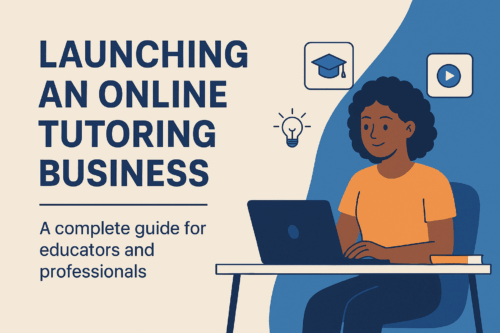Launching an Online Tutoring Business: A Complete Guide

The education industry has undergone a digital transformation, and online tutoring businesses are at the heart of this change. From ICT tutoring online to online mathematics tutoring, students and professionals worldwide are turning to digital platforms for flexible and affordable learning.
For education graduates and skilled professionals, starting an online tutoring business offers the opportunity to earn income, share knowledge, and reach global audiences. This guide explores everything you need to know about launching, marketing, and scaling a successful online tutoring business.
Why Online Tutoring is a Growing Opportunity
The demand for online learning is rising due to several factors:
- Remote learning platforms are booming – schools, parents, and students now prefer flexible education.
- High-demand subjects – coding lessons for beginners, ICT literacy, mathematics, and science are in demand globally.
- Accessible income opportunities – online teaching jobs for graduates provide a chance to earn while working from home.
The shift to digital learning is here to stay, making this the perfect time to build a tutoring business online.
Types of Online Tutoring Services
One-on-One Tutoring
Personalized lessons tailored to individual student needs. Great for subjects like mathematics, coding, or ICT skills.
Group Tutoring
Teaching multiple students at once via Zoom or Google Meet. This model increases revenue and encourages collaboration among learners.
Courses and Recorded Lessons
Creating pre-recorded video lessons or subscription-based courses on platforms like Udemy or Teachable. This provides a scalable income model.
Choosing the Right Niche
Finding your niche ensures your business is both profitable and impactful. Consider:
- Strengths and Passions – What subjects or skills are you most confident teaching?
- Market Demand – STEM, coding, and digital literacy are highly sought after.
- Target Audience – Parents, students, schools, or professionals seeking productivity software training.
Popular niches include coding lessons for beginners online, online mathematics tutoring, and teaching productivity software online like Microsoft Office or Google Workspace.
Essential Tools and Platforms
Communication Tools
- Zoom – widely used for live tutoring sessions.
- Google Meet & Microsoft Teams – great for integrating with schools and businesses.
- WhatsApp & Skype – for quick lessons and communication.
Learning Management Systems (LMS)
- Moodle, Canvas, Blackboard, Google Classroom – perfect for structured courses and managing multiple students.
Interactive Tools
- Kahoot, Quizizz, and digital whiteboards – keep students engaged and make learning interactive.
Setting Up Your Tutoring Business
Starting an online tutoring business involves a few strategic steps:
- Define Your Business Model – Decide between one-on-one tutoring, group classes, or recorded courses.
- Create an Online Presence – Build a website or set up profiles on tutoring platforms.
- Develop Lesson Plans – Prepare structured, engaging learning resources.
- Set Up Payment Systems – Use PayPal, Stripe, or mobile money for secure transactions.
- Offer Flexible Booking – Allow students to schedule sessions easily through apps or websites.
Pricing Online Tutoring Sessions
Pricing can make or break your business. Consider:
- Hourly Rates vs. Packages – Beginners may start at affordable hourly rates, while experienced tutors can offer premium packages.
- Subject Demand – Coding and ICT skills may command higher prices compared to general subjects.
- Experience Level – Your qualifications and results justify your rates.
For instance, a Zoom tutoring business setup may include tiered pricing (basic, standard, premium).
Marketing Strategies for Tutors
Even the best tutors need visibility. Effective strategies include:
- Social Media Marketing – Use Facebook, Instagram, and LinkedIn to reach parents and students.
- Search Engine Optimization (SEO) – Rank your tutoring website for terms like “start an online tutoring platform” or “how to earn money as an online tutor.”
- Testimonials and Reviews – Word of mouth and success stories build credibility.
- Partnerships – Collaborate with schools, training centers, or EdTech startups.
- Content Marketing – Share educational blogs, tips, or short video lessons to attract potential students.
Building Trust and Reputation
Trust is the foundation of success in the tutoring business.
- Professional Branding – Have a clean website, professional logo, and consistent profile.
- Consistency in Teaching – Deliver high-quality lessons on time.
- Collect Feedback – Showcase testimonials from parents and students.
- Engage with Clients – Clear communication and updates strengthen relationships.
Scaling an Online Tutoring Business
Growth comes with strategy:
- Transition to Group Classes – Teach larger groups at a lower cost per student.
- Offer Pre-Recorded Courses – Create passive income streams.
- Launch Your Own Platform – Build a branded tutoring platform for independence.
- Collaborate with Institutions – Partner with schools, EdTech brands, or corporate training programs.
You can also read on: https://baobabentrepreneur.com/freelancing-in-it-and-education-technology-a-complete-guide/
Challenges and How to Overcome Them
Running an online tutoring business isn’t without challenges:
- Technical Issues – Poor internet connections disrupt lessons. Solution: invest in reliable tools.
- Student Engagement – Keeping learners attentive online requires interactive tools and engaging teaching styles.
- Global Competition – Competing with big platforms like Coursera or Khan Academy means focusing on personalization and unique value.
- Balancing Workload – Use productivity tools to manage time and tasks effectively.
Future Trends in Online Tutoring
The future of online tutoring is promising, driven by:
- AI and Automation – Personalized learning using AI-driven platforms.
- ICT and Coding Training – Increasing demand for digital and tech skills.
- Hybrid Learning Models – Blending in-person and online tutoring for flexible education.
- Skill-Based Micro-Learning – Short, focused lessons tailored for busy professionals.
Step-by-Step Guide to Starting Your Online Tutoring Business
Step 1: Identify Your Target Market
Before you begin, define who you want to teach. Are you targeting:
- Primary/secondary school students who need academic support?
- University students struggling with ICT or mathematics?
- Professionals needing digital skills like coding or productivity software?
Clear identification of your audience helps in designing lesson plans and pricing strategies.
Step 2: Build a Professional Online Presence
A tutor’s credibility is often judged online before the first class. Invest in:
- A Personal Website – Include services, pricing, reviews, and booking options.
- Professional Profiles – Create tutoring profiles on platforms like Preply, Chegg Tutors, or Tutor.com.
- Social Media Branding – Share educational content on Facebook, LinkedIn, and Instagram to showcase expertise.
Step 3: Create Engaging Lesson Materials
Great tutors go beyond textbooks. Prepare:
- Interactive Presentations – Slides with visuals, videos, and examples.
- Practice Exercises – Quizzes, worksheets, and coding tasks.
- Real-Life Applications – Show how lessons apply to everyday scenarios, especially in ICT and coding.
Step 4: Set Up Easy Payment and Booking Systems
To look professional and scale effectively, set up:
- Online Payments – PayPal, Stripe, Payoneer, or Mobile Money.
- Scheduling Tools – Calendly or Acuity Scheduling for smooth bookings.
- Automated Invoicing – Ensures transparency and builds client trust.
Step 5: Launch and Market Your Services
Start small with a few students and then expand. Promote your services by:
- Offering free trial lessons to attract new learners.
- Using student success stories to showcase impact.
- Running social media ads targeting parents and professionals.
Success Tips for Online Tutors
- Start Small, Then Scale – Begin with one-on-one sessions before moving to group lessons or recorded courses.
- Prioritize Quality Over Quantity – Deliver value in each class to retain students.
- Keep Up with Trends – Stay updated with new software, coding languages, and teaching tools.
- Build Long-Term Relationships – Consistent students provide steady income and referrals.
- Diversify Income Streams – Combine live tutoring with recorded courses, ebooks, or YouTube tutorials.
Case Study: A Real-Life Example
Consider a graduate in ICT education who started offering Zoom-based coding lessons for beginners.
- At first, she charged $10 per session.
- Within six months, she expanded to group classes and launched a mini-course on Udemy.
- Today, she earns consistent income by combining live tutoring, online courses, and consulting for schools.
This example shows how anyone with teaching skills can build a scalable and sustainable tutoring business.
Final Thoughts
The online tutoring industry is one of the fastest-growing sectors in the digital economy. With rising demand for mathematics tutoring, ICT literacy, and coding lessons, the opportunities are endless.
By identifying your niche, building a professional presence, and leveraging modern tools, you can grow from a solo tutor into an entrepreneur running a global tutoring brand.
Remember:
- Start simple
- Focus on student results
- Scale with technology
Your journey as an online tutor could be the gateway to financial independence and educational impact worldwide.
Conclusion
Launching an online tutoring business is one of the smartest ventures for education graduates and professionals in today’s digital economy. With the right niche, tools, and strategies, you can build a rewarding career that impacts learners worldwide.
From online mathematics tutoring to coding lessons for beginners, the demand for quality tutors continues to rise. By leveraging platforms, building a strong reputation, and scaling strategically, you can transform your tutoring service into a sustainable and profitable business.
👉 The best time to start is now. Choose your niche, set up your tutoring platform, and begin your journey in the growing world of online education.















